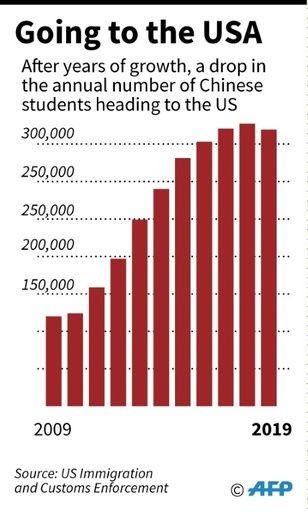9 Chinese Students From Arizona State University Detained At Airport, Sent Back

Nine Chinese students recently arrived at Los Angeles International Airport (LAX) hoping to begin or continue their studies at Arizona State University (ASU). But instead of an Arizona classroom, they were detained by Custom and Border Protection (CBP) officials and later sent back to China as they were “inadmissible” into the United States.
According to university officials, all the students were academically eligible to return to ASU under their visas. The detained undergraduates included some doing life science majors and one engineering student. A spokesperson for CBP said in a statement that there are more than 60 reasons a foreigner might be considered inadmissible, including health-related grounds, criminality, security reasons and immigration violations.
The spokesperson said the students were deemed inadmissible “based on information discovered during the CBP inspection” but offered no other details.
There are two main factors that have contributed to the denial of entry at LAX. First, a political hot-topic in the U.S. is the issue of illegal immigrants, usually targeting illegal and hopeful immigrants from countries south of the U.S. border. Carryover from new policies enacted by the Trump administration will extend to Asian, European and Arab countries as well along with extra scrutiny for students with H-1B visas that allow them to work in the U.S. after graduation.
Second, the escalating trade war currently being waged between China and the U.S. has increased tensions and suspicions between the #1 and #2 world powers. This effects large state university systems like the UC system in California that receives billions of dollars from the federal government and has the most number of Chinese students of any state. Campuses like San Diego State and UC Berkeley report visa delays, federal scrutiny over their research activities and some restrictions on collaborative projects with China and Chinese companies.
The universities are concerned because a drop off in the number of foreign students means a reduction of income to their coffers. ASU President Michael Crow last week sent letters to the Department of Homeland Security (DHS), which has jurisdiction over CBP, and the State Department, requesting a review of each student’s situation and an explanation of the “standard procedures” for screening international students and their electronic devices.
The letters read, “In our country, where we value due process and celebrate the different ways in which our government behaves from that of the arbitrary and capricious behavior of other nations, it is beyond my comprehension how the US government could establish and implement policies that bring about the outcomes we are now witnessing.”
One lesser factor that may be part of the increased scrutiny is that American scholars in China face far more restrictions in China to archives and visas than Chinese students face in the U.S.
Robert Daly, director of the Kissinger Institute on China, said, “Chinese scholars who come here have had full access including full access to the archives. The US situation is increasingly politicized, but there’s no comparison to China. Chinese universities are run by Communist Party cells with American ideas explicitly warned against. There’s not perfect parallelism.”
So, the CBP actions at LAX may be nothing more than a “tit-for-tat” move by the U.S. authorities as tensions mount.
© Copyright IBTimes 2024. All rights reserved.




















